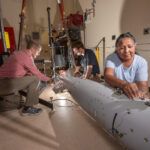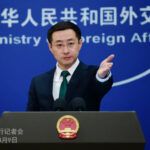Establishing the next president’s national security agenda: Part I
By Gordon Adams | June 4, 2008
With the presidential primaries ending this week, it’s time to focus on the general election and the key national security challenges that the next president will face. Over the next three columns, I will outline what national security issues I think the candidates should be debating.
But first, a cynical observation that comes from spending too much time on presidential campaigns over the years: Sadly, the coming campaign will most likely be a shadow play rather than a discussion about how the United States should deal with its fundamental security issues over the next decade. Typically, campaigns focus on the marginal, pump up the trivial, and search for personal weaknesses. Assuming that Illinois Sen. Barack Obama will be the Democratic nominee and Arizona Sen. John McCain will be the Republican nominee, the media will almost certainly focus with laser-like precision on core issues such as age, experience, religious associates, race, spouses, health, and other heretofore undiscovered irrelevant minutia.
The current national security debate is wildly off the mark. Instead of looking ahead, we’re looking backward: Terrorism, WMDs, and Iraq dominate the national security agenda.”
That said, it’s important that we tune out this white noise, because the current national security debate is wildly off the mark. Instead of looking ahead, we’re looking backward. Terrorism, weapons of mass destruction, and the Iraq War dominate the national security agenda. As such, we’re trapped in a rhetoric of fear and the language of threats. It’s critically important to leave this rhetoric behind; otherwise, we’ll never find a solution to any of the challenges we face, leaving us to continue to cower behind an overtaxed military, the only instrument of U.S. power we think can do the job.
Before addressing the underlying challenges the new president will face, let’s make a few assumptions:
- The new president will not ignore a terrorist attack against the United States or its interests;
- The new president will want to reduce the U.S. presence in Iraq as swiftly as possible, even if McCain says otherwise;
- The new president will use negotiations to limit nuclear proliferation, not military force, which creates too many incentives for proliferation to continue.
Now, the challenges. By my count there are a total of five, which are interrelated. They include:
- The global economy. This time it really is the economy, stupid. Energy supplies and prices are stressing all industrialized economies, and they risk undermining less developed and weaker economies. To say nothing of how the global crisis in food production and soaring prices for agricultural commodities could exacerbate conflict in Asia and Africa. Then there’s the critical issue of the uneven distribution of wealth and persistent poverty in a belt of countries stretching from southern Africa, across the Middle East and South Asia, to parts of Southeast Asia. Not to mention, a growing instability of international financial markets. The next president cannot ignore these things. Energy, finances, commodities, and poverty are a witches’ brew capable of undermining other national security objectives and creating new conflicts to worry about. Therefore, they demand new and imaginative approaches.
- Inadequate governance. Governments throughout the world are struggling to ensure the security of their citizens and keep order within their boundaries. Some states have failed; some are fragile; and some are so brittle that they could collapse with a hard push. The consequences of failed states are multiple–sudden or endless migrations, increased poverty, ethnic strife, and civil conflict–and can prove destabilizing both regionally and globally. It’s a problem that goes far beyond the distracting fascination with “promoting democracy.” Effective and efficient governance that even modestly responds to citizens’ needs would put many countries further along the development path than they currently reside.
- Identity as a source of conflict. It’s too often wrongly assumed that conflicts over ethnicity, nationality, and religion are a reflection of an underlying economic or political clash, with identity simply being manipulated to play out that more fundamental struggle. If anything, the last 20 years worth of conflict in the Middle East, South Asia, and East Asia have made clear that identity has its own standing as a source of conflict. Identity may be connected to economic and political disagreements, but it can be an equal cause of such disagreements. As such, it needs to be addressed in its own right.
- The weakening of national boundaries. A growing share of today’s challenges are transnational, problems which, by their nature, flow across national boundaries. They include the current wave of terrorist attacks by organizations that are generally organized independently of states, are often funded privately, and act without state permission or approval. They also involve fundamental cross-national challenges such as migrating populations, international crime and narcotics trafficking, infectious diseases, and a degraded environment and climate change.
- The decline of U.S. leadership. The American century was brief. China and India have emerged as increasingly strong global players–a trend that will only intensify in the coming decades. Similarly, continuing a process that began more than 60 years ago, the European Union is emerging as a more coherent international actor–especially on security issues. New leaders such as Brazil, Nigeria, Iran, Indonesia, and Australia are also emerging at the regional level, which is checking U.S. influence on policies in the regions where these countries reside. Some of these regional powers are extending their economic power; others may seek greater military strength by expanding their military capabilities or seeking nuclear weapons.
In many ways, these challenges are mutually reinforcing. The economic challenges reinforce the weaknesses in governance and exacerbate underlying identity conflicts. Regional powers may seek to exploit terrorist capabilities to extend their influence or try to shape new economic or security regimes that don’t involve the United States. Each of the five challenges is also massive, surpassing the ability of any single country to find solutions or provide the resources that can shape the solution.
Beginning in January, the next administration needs to come to grips with these challenges. Not one of them can be ignored, and they must be treated together. The new president also must recognize that unilateral efforts to impose U.S. national security policies will fail and accelerate the deterioration of global U.S. leadership, making it impossible for Washington to influence the way in which these challenges should be addressed.
The solutions must be multilateral at home, too, as these challenges demand that the next president devise policies that cut across U.S. national security institutional boundaries. This means we can only deal with them by strengthening the entire toolkit of U.S. statecraft, ending the practice of employing the military in every area of national security policy, and taking a different approach to the way in which the White House is organized and leads the national security policy process.
In my next two columns, I will deal with this requirement for the transformation of the U.S. national security toolkit to confront these challenges.
Together, we make the world safer.
The Bulletin elevates expert voices above the noise. But as an independent nonprofit organization, our operations depend on the support of readers like you. Help us continue to deliver quality journalism that holds leaders accountable. Your support of our work at any level is important. In return, we promise our coverage will be understandable, influential, vigilant, solution-oriented, and fair-minded. Together we can make a difference.
Topics: Columnists, Nuclear Weapons















